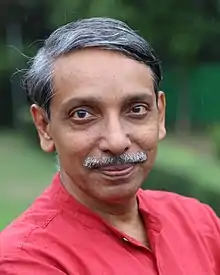M. Jagadesh Kumar
Mamidala Jagadesh Kumar is an Indian academician, electrical engineer, education administrator. He is currently the chairman of University Grants Commission, since February 2022.[1] He is a professor in the Department of Electrical Engineering at IIT Delhi.[2][3] Kumar also served as the VC of JNU from in January 2016 to 2022.[4][5]
M. Jagadesh Kumar | |
|---|---|
 | |
| Chairman of the University Grants Commission | |
| Assumed office 4 February 2022 | |
| Preceded by | D.P. Singh |
| Vice-Chancellor of Jawaharlal Nehru University | |
| In office 28 January 2016 – 3 February 2022 | |
| Preceded by | Sudhir Kumar Sopory |
| Succeeded by | Santishree Dhulipudi Pandit |
| Personal details | |
| Education | M. Sc and PhD in Electrical Engineering |
| Alma mater | IIT Madras |
Background
Kumar was born in Mamidala village in Tipparthi mandal, Nalgonda district, Telangana. He did his Masters and PhD in Electrical Engineering from Indian Institute of Technology, Madras.followed by post doctoral research at University of Waterloo, Canada.[2][6] He works in the area of nanoscience and nanotechnology (nano-electronic devices, nanoscale devices, device design and power semiconductor devices).[2][7] He is currently a fellow at Institution of Electronics and Telecommunication Engineers, National Academy of Sciences, India and Indian National Academy of Engineering among others. He is Chairman of the governing body of National Council of Science Museums. He has received the "ISA-VSI TechnoMentor Award", with the award being presented by Dr. R. Chidambaram (Principal Scientific Advisor to Government of India).[2]
He was selected as the Vice-Chancellor of Jawaharlal Nehru University from among four others including Rameshwar Nath Koul Bamezai, Virander Singh Chauhan and Ramakrishna Ramaswamy.[8]
During his tenure as VC, he has often been in the news for many controversies happening on his watch such as the 2016 JNU sedition row, the disappearance of a student Najeeb Ahmad and the 2020 JNU attacks. Critics say that he is "implementing the agenda of the RSS", the reason why he has been made VC in the first place.[9][10] JNU Students' Unions called for his resignation following the attacks on JNU in January 2020.[9]
Bibliography
Co-Authored three books with research students:
- Mamidala Jagadesh Kumar, Pratyush Pandey, and Rajat Vishnoi (November 2016). Tunnel Field-effect Transistors (TFET): Modelling and Simulation. Wiley, UK
- Mamidala Jagadesh Kumar and Sneh Saurabh (November 2016). Fundamentals of Tunnel Field-Effect Transistors. CRC Press (Taylor & Francis)
- Mamidala Jagadesh Kumar and Shubham Sahay (February 2019). Junctionless Field-Effect Transistors: Design, Modeling, and Simulation. Wiley-IEEE Press, USA
References
- "JNU V-C M Jagadesh Kumar is new UGC Chairman". Hindustan Times. 2022-02-04. Retrieved 2022-02-04.
- "Profile Prof. M. Jagadesh Kumar" (PDF). Institute of Cost Accountants of India. Archived (PDF) from the original on 7 January 2020. Retrieved 7 January 2020.
- "IIT Professor Jagadeesh Kumar Takes Over As JNU Vice Chancellor". NDTV. PTI. 27 January 206. Retrieved 2020-01-07.
{{cite web}}: CS1 maint: others (link) - "RSS Linked IIT-D Professor Set to Be Next JNU VC ?". The Citizen. 21 January 2016. Archived from the original on 7 January 2020. Retrieved 2020-01-07.
- "Professor from IIT Delhi, a Karate Expert, Chosen as JNU Vice-chancellor". The New Indian Express. Retrieved 2020-01-07.
- "Prof. M. Jagadesh Kumar" (PDF). Indian Institute of Science. Archived from the original (PDF) on 7 January 2020. Retrieved 7 January 2020.
- "A detailed report on the IEEE International Conference on Circuits, Systems, Communication and Information Technology Applications (CSCITA 2014)" (PDF). St. Francis Institute of Technology (SFIT). p. 3. Retrieved 7 January 2020.
- "Professor M Jagadesh Kumar appointed JNU Vice Chancellor". CFO India. Retrieved 2020-01-09.
- "JNU VC Jagadesh Kumar and his many controversies: Now, student union wants him out". The Week. 6 January 2020. Retrieved 2020-01-07.
His detractors say the vice chancellor, who took charge in January 2016, is implementing the agenda of the RSS and has been brought in by the Union government specifically for this purpose. However, he has repeatedly disavowed associations with any organisation.
- Bal, Hartosh Singh (1 April 2019). "How the RSS is infiltrating India's intellectual spaces". The Caravan. Retrieved 2020-01-09.